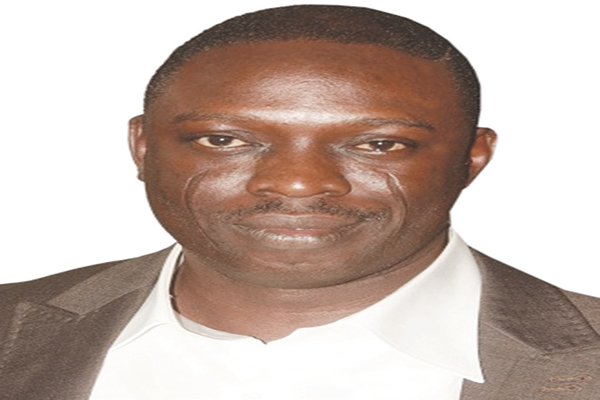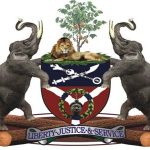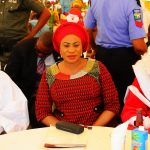
INTERVIEW: Osun Has The Worst Form Of Opposition –Ilori
 Hon. Bola Ilori is the Special Adviser to the Governor of the State of Osun, Ogbeni Rauf Aregbesola on Environment. He was at the 4th Africa Digital Forum and Award Night, with the themed: “Broadband: Catalyst for Tomorrow’s Economy Today” held in Lagos. He speaks at the event with ROBERT AWOKUSE on the financial condition of the state, the state position on broadband among other issues. Excerpts:
Hon. Bola Ilori is the Special Adviser to the Governor of the State of Osun, Ogbeni Rauf Aregbesola on Environment. He was at the 4th Africa Digital Forum and Award Night, with the themed: “Broadband: Catalyst for Tomorrow’s Economy Today” held in Lagos. He speaks at the event with ROBERT AWOKUSE on the financial condition of the state, the state position on broadband among other issues. Excerpts:
The state of Osun and some other states of the federation have been in financial quagmire in recent time. How will the state wriggle out of this financial mess?
Like you have said this is not peculiar to Osun state alone. 26 states got bailouts. Lagos with its Internally Generated Revenue, IGR is equally indebted. In fact, in the last four months of former president, Mr. Goodluck Jonathan’s administration, the federal government borrowed to pay salaries. So it’s a Nigeria problem but when you narrow it down to Osun it shows bias or that one is not conversant with the happenings in the country.
But we are looking at the debt profile of Osun in relation to other states.
The debt profile of Osun is not the highest. Kogi got the highest amount as bailout, it’s just that Osun was targeted for political reason, because Osun was totally opposed to PDP, so, it was easy to paint Osun as a worst hit. And I’m giving you fact now, go and find out. Osun is not the worst of all as painted by the opposition. The question is how do we find ourselves here as a country, and it is getting worst for the country. Buhari has declared that Nigeria is broke, so it’s not just about a state. Nigeria used to share N1.3 trillion on monthly basis but in the last three months the highest we have shared is N600 billion and that is why the states are now getting paltry sum which is not even enough to pay salaries. Forget about deduction for loan, the salary in Osun alone is N3.6 billion. So the entire gross allocation cannot pay salary.
So where do we go from here?
It’s IGR, people have to pay taxes. I remember growing up then, if you don’t pay your tax you can’t even marry. Our value system needs to change. The era of free money in this country is over and people need to realise this because the oil is not even selling again. The biggest challenges we have now is not even about the low price of oil but people are not even buying the oil; under 40 dollar per barrel they are not even buying. The Salaries, Wages and Fiscal Commission said in the next six months many states will go bankrupt. Osun will survive it, because Aregbesola is very sincere to have come out with the debt profile of the state, while many states in Nigeria did not declare their debt profile. You will see what will be happening in some months to come because they refused to put their debt profile on the table when the bailout facility was made available. You can see that in the last few weeks now, Osun is back and it has started doing projects, because we have realised our situation, we are facing governance squarely, no more frivolity.
Beyond the tablet, “Opon Imo” initiative what other area has the State of Osun encouraged access to broadband penetration?
We have a serious challenge of intermittent cable cut because of the distance between Lagos and Osun which is a little far. Nevertheless the government of the State of Osun has been very passionate about information technology. That is why we are trying to link all our institutions with broadband, virtually all the offices now in the state is connected to internet facilities. We tried having what they called digital canopy at a time so that people can have access to internet facilities. Once we get over the issue of cable cut, our people can all be enjoying it.
How do you intend to create more awareness for broadband use in the state, are you going to be taking the campaign to schools and so on?
You will not be getting it right when you say we should take the campaign to them because it’s already a daily reality there, having the capacity is the key issue here not about awareness. We still depend largely on these mobile communication service providers and they are limited when it comes to what they can provide. We need dedicated internet provider to increase accessibility to broadband. Our people are aware already; we share “Opon Imo” to our students, you will be shock what the students do with it on their own; the extent they have taken Opon Imo to on their own and these are students from poor background. The distribution of Opon Imo in Osun kick started a revolution. People who ordinarily wouldn’t have access to it at age 12, age 13 are already playing around with it and that has opened their mind to the need for broadband.
This “Opon Imo” has been described by the opposition as a means of just providing job for the boys and that it’s not sustainable given the economic crisis the state is going through currently, what do you have to say to this?
The work of opposition is just to criticise and unfortunately Osun has the worst form of opposition; the people who are just destructive in their criticism. This Opon Imo has been adopted by UNESCO as a standard for education and don’t forget the United Nations had also awarded it as the best innovation in education in year 2013. Of course you know that it is not a local award. So, to say that Opon Imo is not sustainable is funny. It’s not as if we are buying new ones, the ones we have bought are what we upgrade. We only replace faulty ones. I went to school in those days of free education when books were being shared to students. What they did then was that at the end of the session you submit the books back to the school. When one is lost, you pay for it. That is exactly what we are doing with Opon Imo. It’s meant for SSS 3 students alone, and the moment you finish your SSCE, you submit your it before you collect your result. It is configured for individual student so you can’t take another person’s own. We reconfigure for the new set and upgrade as the syllabus changes. So what is not sustainable in that, it’s only poverty of idea and lack of vision that makes people think that way.
Lastly, we learnt that the four tertiary institutions in Osun, colleges of education and polytechnics will not be admitting students for 2015/2016 academic session and that the governor has asked the schools to go into short courses in entrepreneur programmes, is this correct?
Yes, this is still part of facing realities; life cannot go on as it used to be before now. When Aregbesola assumed office as the governor of the state, the percentage of students who passed WASC with five credits was three per cent. An average of 41,000 students annually sit for WASC in Osun, only three per cent of them will pass with five credits. Now it has improved to 21 per cent, though still bad, but far better than what we met. You now wonder what happen to the remaining 79 per cent of the students, they are going to become mechanics, bricklayers, tillers and so on.
We sat down and look at it that we can’t abandon these people. Our society needs this kind of services. Most times, we travel as far as Togo to bring tillers. So instead of continuing churning out people who will be useless to the society every year, even the polytechnics that supposed to train technicians are just churning out people with academic qualification, so we are changing from paper based certificate to quality education.
What becomes the fate of the candidates who have already chosen any of these institutions since the state did not officially write JAMB to remove them from the brochure so that candidates wouldn’t choose them?
Anybody who is in this country should know that Osun is not admitting for 2015/2016 academic session, but if you say many people don’t know, then we will make a public announcement. You should know that with the state of things in Osun now, we need to reprioritize. We are not merging those institutions as rumoured out there, even though the interest of those who are protesting against this is the economic gain they derive from those institutions, not for academic reason. Majority of those who attend the institutions are not from Osun because if only 21 per cent of the students passed WASC, what happen to the rest, so we are looking at education in the real sense of developing human capacity not just churning out people with paper qualification who cannot translate their knowledge to economic benefit for the society.
NATIONAL MIRROR



